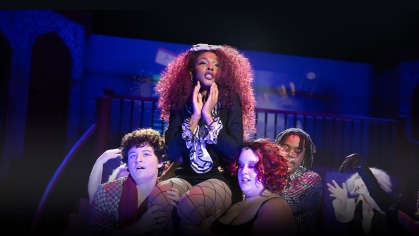Sign of the Times: Kotsur’s historic Oscar win evidence of progress, says Rutgers–Camden researcher
Iconic moment shines light on acceptance of those with differing abilities
April 13, 2022
At the 94th annual Academy Awards, Troy Kotsur accepted the Oscar for best actor in a supporting role for his portrayal of Frank Rossi in the film CODA. For the longtime actor and director, the win was the first time that a deaf male actor won the supporting actor award and the first time that a deaf actor won an Oscar in more than 35 years. Before a crowd collectively signing applause, Kotsur dedicated his win to the deaf and CODA communities, acknowledging, “This is our moment.”
Looking on from home, Rutgers University–Camden researcher Sam Rabinowitz knew the win was a sign of the times. “It brought a happy tear to my eye,” said the distinguished service professor. Rabinowitz’s research has focused on work attitudes toward those with differing abilities, as well as on accommodating employees under the Americans with Disabilities Act. “If society has progressed in entertainment, it’s meant that a film like CODA has deaf adults who are playing roles in a story about deaf adults. That is definitely evidence of societal improvement.”

Troy Kotsur at the 94th Academy Awards on March 27 at Dolby Theater in Los Angeles
Rabinowitz said that first “all the credit in the world” goes to Marlee Matlin for being “the baton carrier for the deaf community” since winning the Academy Award for best actress in 1987 in her role as Sarah Norman in the romantic drama film Children of a Lesser God. He noted that being representative of people with a differing ability can put an inordinate amount of pressure on anyone. However, Matlin has continued a long string of acting successes, including the role of Jackie Rossi in CODA. “She could just as easily crashed and burned since winning that award,” said Rabinowitz, “but she’s not showing any signs of slowing down.”
On a more personal level, Rabinowitz said, it’s hard not to see Kotsur’s historic win through the eyes of his son, Richard, who was born profoundly hearing impaired and has two cochlear implants. He said that watching Richard grow older has made him especially attuned to how accepting people are of those with differing abilities. His son – who graduated with a bachelor’s degrees in economics and sociology in 2002 and a master’s degree in city and regional planning from Rutgers University in 2004 – learned English through reading books and closed captioning on TV. “He read text before texting,” he said, adding that Richard now works as a transportation planner for the New Jersey Department of Transportation.
Just as he had once told his son, Rabinowitz posited, “Everyone at some point in time is an O in a group of Xs,” meaning that everyone can be an exception to the norm. In Kotsur’s case, that has meant taking on the challenge of often being the only deaf person in a room of hearing people in order to pursue his dreams in the entertainment industry. He noted that, in addition to appearing in Star Wars: The Mandalorian, the award-winning actor even developed a variant of sign language for his role – a major accomplishment in itself. “He has contributed in multiple capacities in the industry, proving that he’s an actor who happens to be deaf, not a deaf person who happens to act,” said Rabinowitz.
The Rutgers‒Camden researcher acknowledged that he doesn’t know if Kotsur’s historic win or the focus of the movie itself will further change peoples’ attitudes towards those with differing abilities, but it does bring an added level of openness to the discussion. “For children growing up,” he said, “They can point to Kotsur and say, ‘There’s one more role model with the same differing ability as me.’”

Sam Rabinowitz
Rabinowitz has similarly worked to open the discussion on campus. As a member of the Rutgers‒Camden Disability Advisory Council, he co-wrote and led training sessions to increase the understanding and awareness of accommodations to meet the needs of students with differing abilities. The initiative is detailed in the paper “Disability Awareness, Training, and Empowerment: A New Paradigm for Raising Disability Awareness on a University Campus for Faculty, Staff, and Students,” published in the journal Social Inclusion.
The greater societal message, he added, is to be aware that everyone is different and everyone has differing degrees of abilities in different areas. “Don’t prejudge; get to know the individuals beyond what you perceive their differing abilities to be,” said Rabinowitz. “We are all three-dimensional.”



